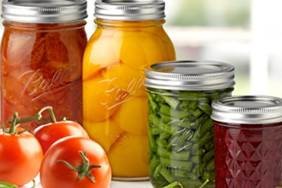Food preservation is the process of treating and handling food to stop or greatly slow down spoilage (loss of quality, edibility or nutritive value) caused or accelerated by micro-organisms. Maintaining or creating nutritional value, texture and flavor is important in preserving its value as food.
Canning and Freezing Classes offered:
Learn safe, reliable food preservation methods. Great for beginners or as a refresher course. Take home research-based resources, a jar of homemade goodness and try tasty samples!

Home Canning
Learn equipment needed, where to find reliable recipes, when and how to use water bath and pressure canners, latest tested technology, time saving techniques, etc.

Freezing Foods
Learn to freeze foods for best quality and to save money, how to select a freezer and equipment, recommended storage methods, how to prevent freezer burn, etc.
The Canning and Freezing classes offered by UT/TSU Extension have ended for the 2025 season. However, we are offering one more of each class in partnership with The Chattery. Click the links below to find out more information and to register for those classes. Registration is handled by The Chattery and therefore, the pricing is slightly different.
Food Preservation classes are generally offered during the Spring and Summer months. To add your name to the interest list for future Food Preservation Classes, please provide your contact information or call the Extension Office at (423) 209-8560.
Additional Resources:
- USDA National Center for Home Food Preservation – Canning, freezing and drying instructions, recipes, etc.
- UT Extension Publications:
- Canning Foods
- This publication is available for purchase from UTIA Publications.
- Freezing Foods
- Canning Foods
- Free Preserve Smart App – for Apple and Android devices – and a mobile-responsive online version. Shopping guide – how much produce to buy, recipes, etc.
- Upload your elevation
- Basic how-to videos (3-8 minutes each) from University of Minnesota
- Canning Timer & Checklist App from Oregon Extension Service – Generate a checklist and timer for processing over 50 popular foods. Set jar size, pack type, canning method, and elevation. Designed for people with previous canning experience.
- Information on commercial food safety, equipment, processing, nutritional labeling and regulatory requirements associated with food manufacturing.
- For how-to videos, updates on local events and educational posts, follow us on FaceBook: Tennessee Saves Chattanooga Chapter